

DIALOGUE
A Quarterly Publication of the Regional Center of Orange County
IN THE SPOTLIGHT
What are Conservatorship and Supported Decision-Making?
MANY PARENTS FIRST BEGIN THINKING ABOUT THE CONCEPT OF CONSERVATORSHIP as their son or daughter is approaching the age of 18. Some may worry that their child becoming an adult will cause a parent to be shut out from important decisions about school, healthcare, finances and RCOC-funded services. While these are reasonable concerns, it’s important to understand that a decision for or against conservatorship should be based on the specific needs of an individual.
Of the more than 14,000 adults RCOC serves, less than 25 percent have a conservator. This article provides some basic facts and resources for families and individuals to explore.
What is Conservatorship?
Conservatorship is a legal process through which a court grants authority to a third-party (often a parent) to make decisions on behalf of an adult who is considered vulnerable and in need of protection due to a developmental disability or mental health issues. Limited Conservatorship is a type of conservatorship specifically for people with developmental disabilities.
The person who is granted this authority is called a “conservator” and the person conserved is called a “conservatee.” In some other states, this legal arrangement may be called “guardianship.”

Seven Possible Powers of Limited Conservators
When limited conservatorship of the person is granted, decision-making authority over the conservatee can be limited to just a few key areas, or can extend to virtually all aspects of the person’s life, including:
1. Residence: The conservator can decide where the conservatee lives.
2. Confidential Records: The conservator can access the conservatee’s confidential records and papers, such as financial, medical and educational.
3. Marriage: The conservator can consent or withhold consent to the conservatee’s marriage.
VOLUME 39 NO. 3 • SUMMER 2025 Cont. on Page 7
DIALOGUE
This newsletter can also be read online at RCOC’s website: www.rcocdd.com
Copyright © 2025
Board of Directors
Sandy Martin, Chair
Meena Chockalingam Bedekar, Vice Chair
Jacqueline Nguyen, Treasurer
Yvonne Kluttz, Secretary
Marcell Bassett
Bruce Hall
Frances M.K. Hernandez
Amy Jessee
Liza Krassner
Lorena Medina
Hilda Mendez
Chinh Nguyen
Fernando Peña
Rick Perez
John “Chip” Wright
Please check the Monthly Calendar on RCOC’s website for the most up-to-date information regarding Board meeting dates and format.
RCOC Administration
Larry Landauer, Executive Director
Arturo Cazares, Associate Executive Director
Christina Petteruto, General Counsel
Marta Vasquez, Chief Financial Officer
Jerrod Bonner, Information Technology Director
Bonnie Ivers, Psy.D., Clinical Director
Jennifer Montañez, Director of Case Management
Stacy Wong, Human Resources Director
Carmen Gonzalez, Associate Director, Central Area
Rachel Khorana, Associate Director, Intake
Araceli Mendez, Associate Director, Early Start
Carie Otto, Associate Director, West Area
Greg Shimada, Associate Director of Information Technology
Jack Stanton, Associate Director of Housing
Sean Watson, Associate Director, Risk Management
The Life Care Portfolio Keeps Important Information Organized
OFFERED SEVERAL MONTHS AGO TO FAMILIES AND PERSONS SERVED BY RCOC, THE LIFE CARE PORTFOLIO is helping to simplify the process for organizing health, life, work, and educational history and documentation pertaining to a loved one with disabilities.
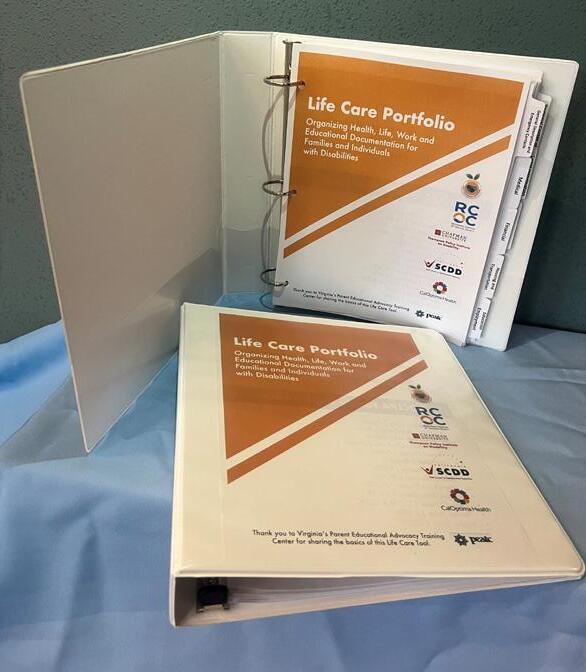
Divided into eight sections, it covers virtually all aspects of a person’s life, from basic facts about that person, to routines and living situation, essential health and medical information, financial accounts, work or educational documentation, and more.
Melissa Cory, the parent of a son with autism and chair of the Orange County Local Partnership AgreementFamily Work Team that developed the Portfolio, and RCOC Board Chair Sandy Martin are enthusiastic about how practical and comprehensive it is. They’re particularly enthusiastic about how easy it is for caregivers to modify it as circumstances change, and the capacity to tailor the Portfolio to include only the information a family needs.
The Life Care Portfolio is helping to simplify the process for organizing health, life, work, and educational history and documentation pertaining to a loved one with disabilities.
For example, Sandy noted that she and her husband have both a complete version for their adult son, as well as an abbreviated “vacation” version, so when the two of them are traveling, a temporary caregiver has certain key details but not access to all of their son’s confidential information.
Melissa emphasizes that the Portfolio is an essential tool for both single-parent and two-parent households, since families often divide responsibilities: “Even my husband wouldn’t know a lot of things if something happened to me,” she said, and the Portfolio provides that detail.
Scan the QR code to download the Life Care Portfolio as a fillable PDF file in English, Spanish, Vietnamese, Korean or Chinese. RCOC’s Comfort Connection Family Resource Center can also print out a hard copy for those without digital access.


RCOC’s Responsibilities with Conservatorship
By Larry Landauer, Executive Director
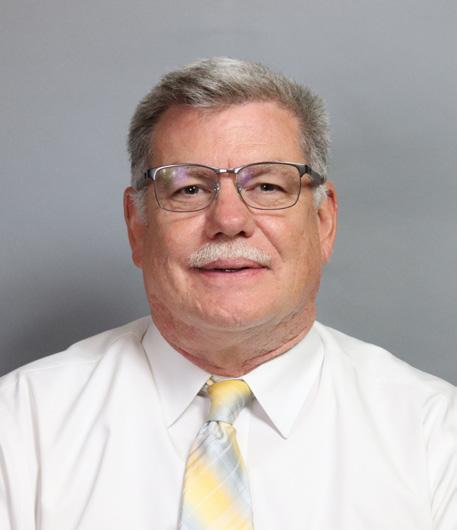
IN THIS ISSUE,
WE’RE FOCUSING ON
ISSUES SURROUNDING
THE TRANSITION FROM PUBLIC SCHOOLBASED SERVICES TO ADULT SERVICES AND SUPPORTS – sometimes called Lanterman Services – funded by the Regional Center. Since this is when some families begin exploring the possibility of conservatorship, I wanted to use my column to add to our educational cover story on the topic by discussing the role and responsibilities RCOC has in the process.
A Court Makes the Decision about Conservatorship
When a family member, typically a parent, decides to seek limited conservatorship of someone we serve, RCOC is required to submit a report to the court that shares our recommendation on whether the specific powers requested by the proposed conservator should be granted.
Conservatorship limits the rights of an individual and gives decision-making power to others, so we take this responsibility very seriously.
Conservatorship limits the rights of an individual and gives decision-making power to others, so we take this responsibility very seriously.
It’s also important to note that while the court will consider the Regional Center’s recommendation, we do not make the final decision. Sometimes the judge in a court is persuaded by the arguments a proposed conservator makes and decides to grant powers RCOC does not think are warranted.
Many families pursue conservatorship on their own, but some may want an attorney to help with the process, which can be expensive. A resource some RCOC families recommend is the Elder Law and Disability Rights Center (scan the QR code for details), which offers free limited conservatorship clinics for parents. Your Service Coordinator can also provide you with a list of attorneys who practice in this area.

RCOC is Always Here for Those We Serve
RCOC works with families beyond an individual’s 18th birthday. The overwhelming majority of adults we serve do not have a conservator, and I want to reassure them and their families that RCOC is always here for them.
Your loved one is not alone if they are not conserved.
In fact, it is common for RCOC to be contacted by medical providers regarding unconserved adults who do not have involved family members and need treatment. In these cases, our medical doctor and nurses are able to consult with medical staff and educate them about the individual’s condition so appropriate decisions can be made in the best interest of the person-served. If necessary, I -- as Executive Director -- or a member of RCOC’s Health Resources Group can give medical consent for treatment.
So, among the most important things to remember is that while each family has to make decisions that are right for them, your loved one is not alone if they are not conserved. The Regional Center supports those we serve for their entire lives.

PERSON-TO-PERSON
Do You Know Someone Who Deserves a Spotlight Award?
By Yvonne Kluttz, PAC Chair and Amy Jessee, PAC Co-Chair
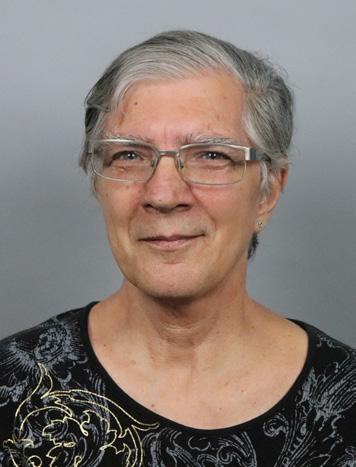
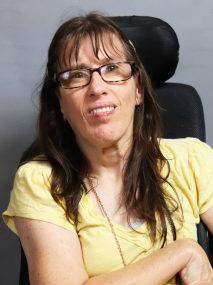
WE THINK IT WAS WONDERFUL TO SEE OUR COMMUNITY COME TOGETHER THIS PAST APRIL FOR A GALA CELEBRATION OF THE INDIVIDUALS AND ORGANIZATIONS HONORED WITH RCOC’S 2025 SPOTLIGHT AWARDS. If you attended the event, or read the Dialogue story profiling the honorees, it may have caused you to think about someone you know who deserves to be honored for the work they do in our developmental disabilities community.
The great news is that you don’t have to wait until next year to submit your nomination! RCOC has made it easy to submit your nominations online throughout the year. Simply scan the QR code here or visit www.rcocdd.com/spotlightawards to see the award categories, nomination handbook and online nomination form in English, Spanish and Vietnamese.

Amy believes this type of recognition is a great honor, and that it’s very important to acknowledge what people who serve do for our community. As a past recipient of the Self-Advocate Spotlight Award, Yvonne agrees, noting that it made her feel stronger about speaking up and advocating for herself and others.
EVERYDAY WELLNESS: Know Your Numbers
PEOPLE WHO HAVE DIABETES ARE AT HIGHER RISK FOR MANY SERIOUS HEALTH PROBLEMS, including heart disease, blindness, and more. However, eating a healthy diet, maintaining a healthy weight, and getting regular exercise can reduce these complications by helping to manage blood sugar levels.
To see if you’re at-risk, your doctor will probably check your A1C level -- also known as the hemoglobin A1C or HbA1c test— which is a simple blood test that measures average blood sugar levels over the past 3 months. Check this American Diabetes Association chart to see if you’re in a healthy range, and be sure to consult your doctor if you have questions.
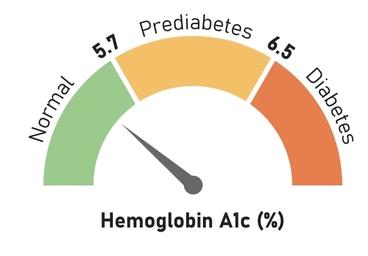

Workshops & Events
Person Centered Thinking: One Page Description Workshop for Families
Tuesday, August 26 from 6-8 p.m.
RCOC’s Santa Ana Office 1525 N. Tustin Avenue
This free workshop is presented in English and will give parents and other adult family members with a loved one served by RCOC the opportunity to practice personcentered skills. Participants will be introduced to key concepts of Person Centered Practices and have the opportunity to draft a one-page description for their loved ones.
Space is limited for this in-person workshop, so registration is required. To register, scan the QR code. Check the Events Calendar on RCOC’s website for sessions offered in Spanish.
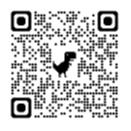
Moving On at 3… Transition Workshop Wednesday, September 24 from 6:30-8:30 p.m.
This free transition workshop takes place virtually, in English with interpretation in Spanish, Vietnamese, ASL and Korean. It aims to educate and support parents before, during and after their child’s third birthday. Topics include assessment and eligibility determination for school district services, the Individualized Education Program (IEP) meeting, and ongoing eligibility for Regional Center services.
Person-Centered Thinking: Workshop for Service Providers
Tuesday, October 14 from 6-8 p.m.
This free workshop is for service providers, vendors, and direct support professionals, but is open to anyone who wants to learn how to use Person-Centered Thinking to create a one-page description and communication chart for someone they support. The event takes place in English.

Scan the QR code or register online via the Events Calendar on RCOC’s website. For information and for help with online registration, contact Patricia Garcia at 714.558.5400 or pgarcia@rcocdd.com.
Space is limited for this in-person workshop, so registration is required. To register, scan the QR code.
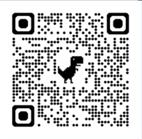
ABC’s of School Services (formerly Special Education)
Transitioning from High School to Adult Services

IN THIS ISSUE, WE CONCLUDE OUR SERIES ON SCHOOL TRANSITIONS FOR STUDENTS – THIS TIME, FOCUSING ON KEY CONSIDERATIONS FOR THE TRANSITION FROM HIGH SCHOOL TO ADULT SERVICES.
This is among the most exciting transitions, because it marks the passage from primarily school-based services and supports to adulthood when an individual who meets Lanterman Act eligibility has services and supports coordinated by the Regional Center. It’s also when the person served and their circle of support decide whether to pursue higher education, seek competitive integrated employment, or access one of the many other community-based day program options for adults.
Your RCOC Service Coordinator is a great source for education and support before, during and after the school transition period, so we cover just a few highlights here.
Your RCOC Services Coordinator is a great source for education and support before, during and after the school transition period.
Start Planning Well in Advance
Because this transition involves big changes, it’s important to begin planning for it many months before the final school year concludes. Many popular programs, especially those offering one-to-one staffing ratios, can be difficult to access due to workforce shortages, so RCOC encourages families to seek referrals at least a year in advance. This allows time for a personcentered process that fully explores what the
person served wants to do and the support they need to get there. Families should also know that many adult day service providers require certain vaccinations before starting a program.
In addition, some new services an individual might need – such as public transportation with OCTA’s Access program -- have separate application processes. After application, it can take a month before an eligibility determination is made.
Attend Transition Planning Workshops
RCOC partners with Chapman University’s Thompson Policy Institute (TPI) on a series of Zoom and in-person transition planning workshops covering topics ranging from adult day services options, to transportation, CalABLE accounts, and more. The OC Ask the Experts series we host with TPI and other partners is a more intimate presentation where families can learn more about transition topics and interact with the guest speakers.
These workshops appear on the Events Calendar on RCOC’s website, which also features excellent resources in the Transition Planning section under the Community Resources tab. Families can also visit www.transitionca.org for a wealth of information, including past webinar recordings and upcoming presentations from RCOC and other experts.

What are Conservatorship and Supported Decision-Making?, cont.
4. Contracts: The conservator can exercise the conservatee’s right to enter into contracts.
5. Medical Consent: The conservator can give or withhold medical consent on behalf of the conservatee.
6. Social and Sexual Relationships: The conservator can control the conservatee’s social and sexual relationships.
7. Education: The conservator can make decisions concerning the conservatee’s education.
While a conservator in California may be granted some or all of these powers, that person or group of people are still expected to help a conservatee be as independent and self-reliant as possible. A Conservator of the Estate can also be appointed in situations where the individual needs assistance managing assets beyond Supplemental Security Income (SSI).
Alternatives to Conservatorship
Before pursuing conservatorship, families are required to consider alternatives to meet the individual’s needs, such as creating powers of attorney. A power of attorney is a legal document that gives a trusted person authority to make decisions for another person – typical powers of attorney are for medical or financial decisions, or both.
Another alternative is a process called Supported Decision-Making.
What is Supported Decision-Making?
Supported Decision-Making (SDM) is typically presented as an alternative to conservatorship that enables the person with disabilities to make their own decisions, while getting help from a trusted circle of support.
The circle of support can include family, friends, caregivers and others who understand the
person’s values, preferences and priorities as well as their unique talents and limitations.
SDM can be as simple as asking a friend for input on a relationship decision, or indepth consultation with family and trained professionals about medical or financial choices. In many ways, it mirrors decision-making processes followed by typical adults without disabilities. It can also be formalized as a written SDM agreement.

Scan the QR code to review Frequently Asked Questions about supported decision-making on the Department of Developmental Services (DDS) website. The document is available in 11 languages.
Where to Learn More
This article covers only basic facts about conservatorship and commonly-discussed alternatives. However, it’s important for adults with developmental disabilities and their families to know the full range of options that will ensure their needs are met and their self-determination rights are respected.
Disability
Rights
California (www.disabilityrightsca.org) is the statefunded organization charged with advocating for the rights of people with developmental disabilities. Their website includes a multitude of educational resources covering many topics of interest to individuals and families we serve, including conservatorship. Scan the QR code to go to the Conservatorship page on their website.

Regional Center of Orange County Locations
How to Become a Wish Tree Sponsor
Are you, your family and friends interested in giving gifts to brighten the holidays for others? Is your organization looking for a meaningful holiday gift-giving project? Please consider participating in RCOC’s Wish Tree program to benefit children and adults with developmental disabilities.
RCOC volunteers wrap and distribute the donated gifts to the selected individuals prior to the holidays, so the deadline to become a sponsor is October 31. To learn how to join the fun, contact Kaitlynn Truong at ktruong@rcocdd.com or 714.558.5405.

Serving Orange County’s Korean Community
REGIONAL CENTER OF ORANGE
COUNTY has prepared this insert especially for the individuals and families we serve who are most comfortable communicating in the Korean language. These events, programs and activities are presented in Korean and/or are geared specifically for those in Southern California’s Korean community. However, some are not funded or endorsed by RCOC and this information is provided as a courtesy. If you know of other opportunities you would like to share with others in the Korean community, please contact RCOC’s Derrick Nguyen at 714.558.5401 or dnguyen@rcocdd.com.
Buena Park Seasonal Events
The following seasonal events are geared for families of all ages and take place at Buena Park Civic Center, 6650 Beach Boulevard in Buena Park. For more information, contact the Community Services Department at finearts@buenapark.com or 714.562.3860.
Culture Fest 2025: Buena Park Culture Fest brings the Buena Park community together to celebrate the rich cultural heritage in the city. Guests can explore different cultures around the world through amazing performances, delicious food, community booths and a variety of family-friendly activities.
Saturday, September 27 from 4-8 p.m.
Cops n’ Goblins: Come out for this fun afternoon filled with Halloween activities, costume contests, games and trunk or treating opportunities. This event is co-hosted with the Buena Park Police Department. Wednesday, October 29 from 2-6 p.m.
RCOC and CAND Host Multicultural Event for Families
Families from diverse cultural backgrounds attended an educational Family Conference on June 7, where they learned about topics such as navigating special education, the new IPP and advocacy, and emergency preparedness. Interpretation services were provided in Vietnamese, Korean, Spanish, and American Sign Language (ASL). Hosted by RCOC in partnership with the Center for Autism & Neurodevelopmental Disorders, the event was funded by the DDS Language Access and Cultural Competency fund.
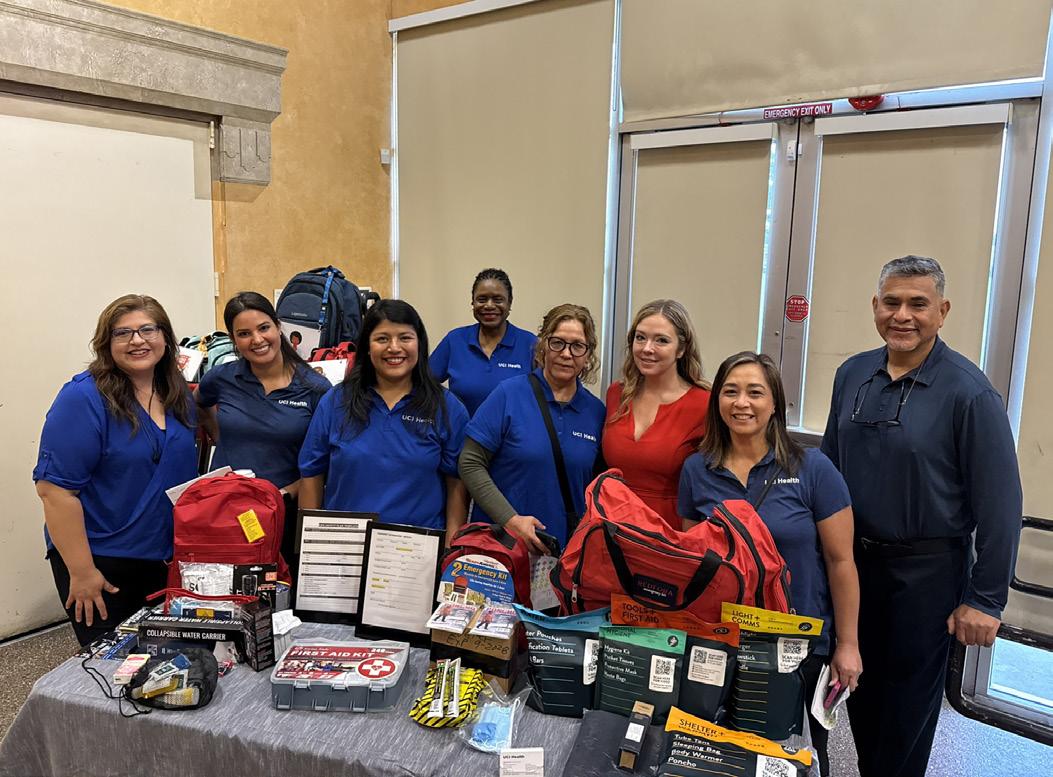
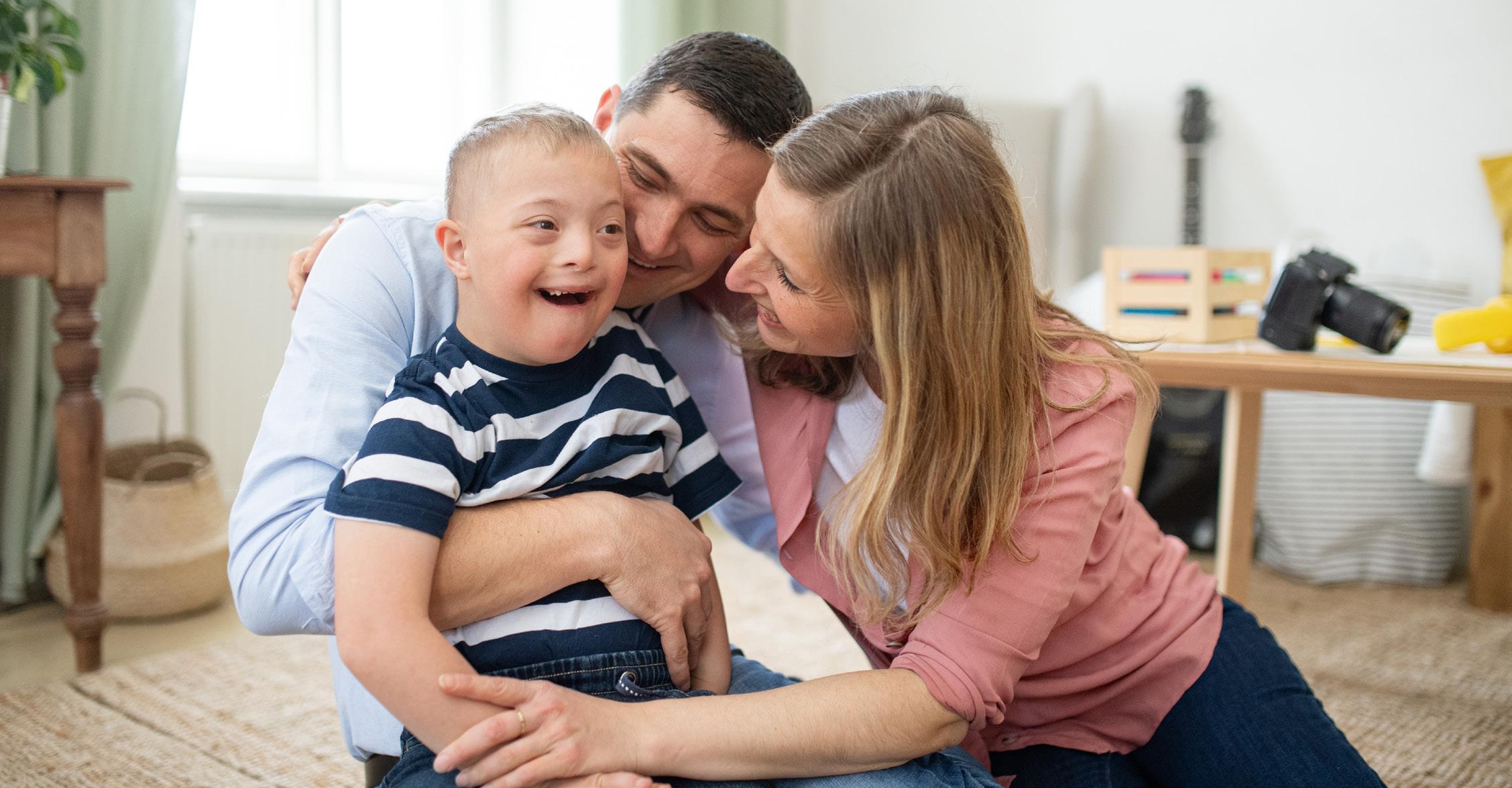
How Can the Life Care Portfolio Help Your Family?
MANY OF US HAVE EXPERIENCED SITUATIONS WHEN THE ONE PERSON WHO HAD KEY PIECES OF INFORMATION WE NEEDED WASN’T REACHABLE.
Often, this only causes inconvenience, but it can be devastating in a true emergency or health crisis. This is especially true when the primary caregiver for a person with disabilities becomes incapable of caring for them, and only that caregiver knows important details about the person’s life, condition and preferences.
You can tailor the Portfolio to include only the information you need.
The Portfolio is designed to be comprehensive and able to accommodate diverse individual and family situations, so some sections may not be applicable to you right now. However, you can tailor the Portfolio to include only the information you need, and it can easily be updated over time as your loved one with disabilities grows and their needs change.
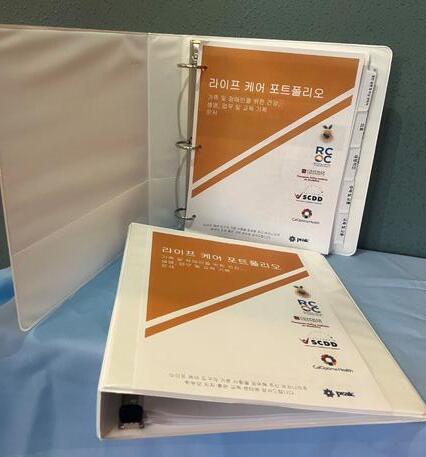
The Life Care Portfolio (see story on page 2) for RCOC families is available in English, Spanish, Vietnamese, Korean and Chinese and simplifies the process for organizing vital information about a loved one with disabilities. Divided into eight sections, it covers virtually all aspects of a person’s life, from basic facts about that person, to routines and living situation, essential health and medical information, financial accounts, work or educational documents, and more.
Many RCOC families say that completing the Life Care Portfolio has simplified their life because it makes important information easily accessible in one place. Importantly, it offers caregivers greater peace of mind, knowing that if another family member needs to step in to help in an emergency, they will have the information they need to ensure continuity of care for the child or adult with disabilities.
To download the Portfolio in your preferred language, simply scan the QR code or visit the Planning for the Future page that appears under the Community Resources tab on our website. RCOC’s Comfort Connection Family Resource Center can also print out a hard copy for you.

Serving Orange County’s Vietnamese Community
REGIONAL CENTER OF ORANGE
COUNTY has prepared this insert especially for the individuals and families we serve who are most comfortable communicating in the Vietnamese language. These events, programs and activities are presented in Vietnamese and/or are geared specifically for those in Southern California’s Vietnamese community. However, some are not funded or endorsed by RCOC and this information is provided as a courtesy. If you know of other opportunities you would like to share with others in the Vietnamese community, please contact RCOC’s Derrick Nguyen at 714.558.5401 or dnguyen@rcocdd.com.
City of Westminster Seasonal Events
The following seasonal events are geared for families of all ages and take place at the Westminster Civic Center, 8200 Westminster Boulevard in Westminster. For more information, contact the Community Services & Recreation Department at 714.895.2860 or csronline@westminster-ca.gov.
Fall Festival: Celebrate the season at the 4th annual Fall Festival, featuring a carnival, live entertainment, delicious food, vendors, fun children’s activities and more. Thursday to Sunday, September 25-28
Halloween Spooktacular: Come out for a night of spooky fun, including a variety of ghoulish activities, games, food, fun, and more. The event kicks off with an exciting Trunk or Treat activity at 4:30 p.m. and closes with a Movie Night at 6:30 p.m. Friday, October 24
RCOC and CAND Host Multicultural Event for Families
Families from diverse cultural backgrounds attended an educational Family Conference on June 7, where they learned about topics such as navigating special education, the new IPP and advocacy, and emergency preparedness. Interpretation services were provided in Vietnamese, Korean, Spanish, and American Sign Language (ASL). Hosted by RCOC in partnership with the Center for Autism & Neurodevelopmental Disorders, the event was funded by the DDS Language Access and Cultural Competency fund.


How Can the Life Care Portfolio Help Your Family?
MANY OF US HAVE EXPERIENCED SITUATIONS WHEN THE ONE PERSON WHO HAD KEY PIECES OF INFORMATION WE NEEDED WASN’T REACHABLE.
Often, this only causes inconvenience, but it can be devastating in a true emergency or health crisis. This is especially true when the primary caregiver for a person with disabilities becomes incapable of caring for them, and only that caregiver knows important details about the person’s life, condition and preferences.
You can tailor the Portfolio to include only the information you need.
The Life Care Portfolio (see story on page 2) for RCOC families is available in English, Spanish, Vietnamese, Korean and Chinese and simplifies the process for organizing vital information about a loved one with disabilities.
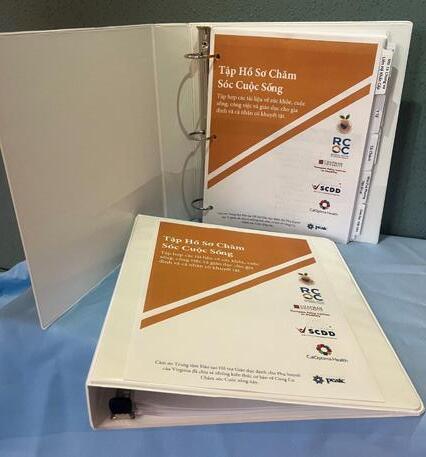
Divided into eight sections, it covers virtually all aspects of a person’s life, from basic facts about that person, to routines and living situation, essential health and medical information, financial accounts, work or educational documents, and more.
The Portfolio is designed to be comprehensive and able to accommodate diverse individual and family situations, so some sections may not be applicable to you right now. However, you can tailor the Portfolio to include only the information you need, and it can easily be updated over time as your loved one with disabilities grows and their needs change.
Many RCOC families say that completing the Life Care Portfolio has simplified their life because it makes important information easily accessible in one place. Importantly, it offers caregivers greater peace of mind, knowing that if another family member needs to step in to help in an emergency, they will have the information they need to ensure continuity of care for the child or adult with disabilities.
To download the Portfolio in your preferred language, simply scan the QR code or visit the Planning for the Future page that appears under the Community Resources tab on our website. RCOC’s Comfort Connection Family Resource Center can also print out a hard copy for you.

Serving Orange County’s Hispanic Community
REGIONAL
CENTER OF ORANGE COUNTY has prepared this insert especially for the individuals and families we serve who are most comfortable communicating in Spanish. These events, programs and activities are presented in Spanish and/or are geared specifically for those in Southern California’s Hispanic community. However, some are not funded or endorsed by RCOC and this information is provided as a courtesy. If you know of other opportunities you would like to share with other Spanish speakers, please contact Comfort Connection Family Resource Center Parent Service Coordinator Giulia Rodriguez at 714.558.5402 or grodriguez@rcocdd.com.
Center for Autism & Neurodevelopmental Disorders
Irvine’s Center for Autism and Neurodevelopmental Disorders (CAND) hosts a number of parent workshops and support groups for Spanish-speakers. The following sessions are offered virtually. To register, scan the QR code or go to www.thecenter4autism.org.

Transition to Adulthood
Thursdays from 5-6:30 p.m.
August 7, September 4, October 2, November 6 and December 4
Conexiones Educativas
Conexiones Educativas is offering these in-person Spanish-language educational workshops for parents of children with disabilities, including all ages and diagnoses. To register, text 714.398.4710.
Fridays from 10 a.m. to Noon
August 29, September 26, October 24, November 14 and December 12
Downtown Anaheim Community Center, 250 E. Center St. in Anaheim
RCOC and CAND Host Multicultural Event for Families
Families from diverse cultural backgrounds attended an educational Family Conference on June 7, where they learned about topics such as navigating special education, the new IPP and advocacy, and emergency preparedness. Interpretation services were provided in Vietnamese, Korean, Spanish, and American Sign Language (ASL). Hosted by RCOC in partnership with the Center for Autism & Neurodevelopmental Disorders, the event was funded by the DDS Language Access and Cultural Competency fund.
Down Syndrome Association of Orange County
The Down Syndrome Association of Orange County’s Mano a Mano (Hand in Hand) program is a free early literacy program for Spanish-speaking children ages 3-6 with Down syndrome. The program also helps parents better understand the IEP process and improve their own language skills. For information, call Alicia at 714.540.5794.
There are three groups, which meet on Saturdays: 9-10:15 a.m., 10:30-11:45 a.m. and Noon to 1:25 p.m.
August 29, September 13, October 11, November 8 and December 13
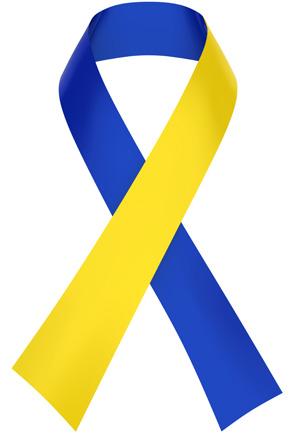
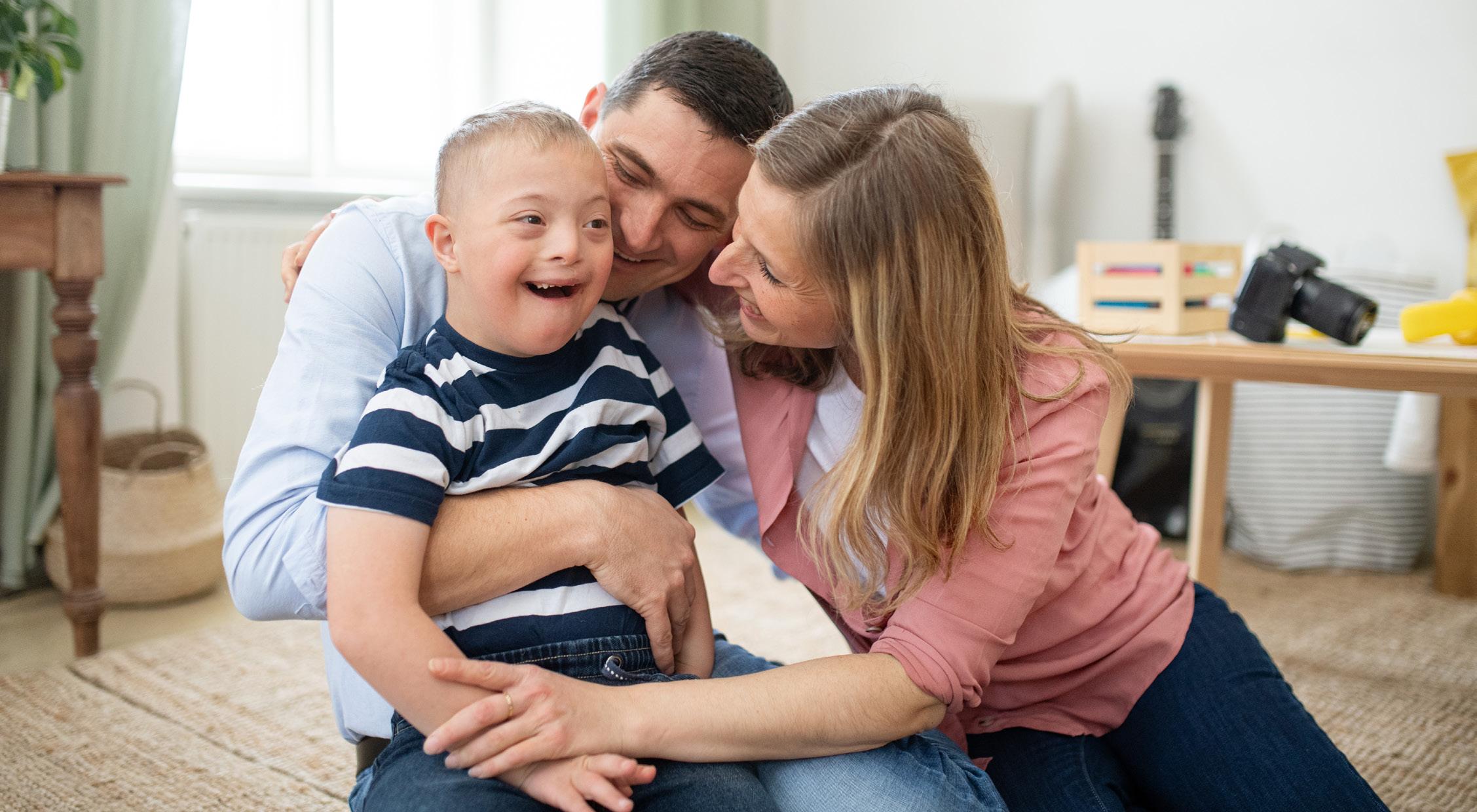
How Can the Life Care Portfolio Help Your Family?
MANY OF US HAVE EXPERIENCED SITUATIONS WHEN THE ONE PERSON WHO HAD KEY PIECES OF INFORMATION WE NEEDED WASN’T REACHABLE.
Often, this only causes inconvenience, but it can be devastating in a true emergency or health crisis. This is especially true when the primary caregiver for a person with disabilities becomes incapable of caring for them, and only that caregiver knows important details about the person’s life, condition and preferences.
You can tailor the Portfolio to include only the information you need.
The Life Care Portfolio (see story on page 2) for RCOC families is available in English, Spanish, Vietnamese, Korean and Chinese and simplifies the process for organizing vital information about a loved one with disabilities. Divided into eight sections, it covers virtually all aspects of a person’s life, from basic facts about that person, to routines and living situation, essential health and medical information, financial accounts, work or educational documents, and more. The Portfolio is designed to be comprehensive and able to accommodate diverse individual and family situations, so some sections may
not be applicable to you right now. However, you can tailor the Portfolio to include only the information you need, and it can easily be updated over time as your loved one with disabilities grows and their needs change.
Many RCOC families say that completing the Life Care Portfolio has simplified their life because it makes important information easily accessible in one place. Importantly, it offers caregivers greater peace of mind, knowing that if another family member needs to step in to help in an emergency, they will have the information they need to ensure continuity of care for the child or adult with disabilities.
To download the Portfolio in your preferred language, simply scan the QR code or visit the Planning for the Future page that appears under the Community Resources tab on our website. RCOC’s Comfort Connection Family Resource Center can also print out a hard copy for you.

Serving Orange County’s Korean Community
REGIONAL CENTER OF ORANGE
COUNTY has prepared this insert especially for the individuals and families we serve who are most comfortable communicating in the Korean language. These events, programs and activities are presented in Korean and/or are geared specifically for those in Southern California’s Korean community. However, some are not funded or endorsed by RCOC and this information is provided as a courtesy. If you know of other opportunities you would like to share with others in the Korean community, please contact RCOC’s Derrick Nguyen at 714.558.5401 or dnguyen@rcocdd.com.
Buena Park Seasonal Events
The following seasonal events are geared for families of all ages and take place at Buena Park Civic Center, 6650 Beach Boulevard in Buena Park. For more information, contact the Community Services Department at finearts@buenapark.com or 714.562.3860.
Culture Fest 2025: Buena Park Culture Fest brings the Buena Park community together to celebrate the rich cultural heritage in the city. Guests can explore different cultures around the world through amazing performances, delicious food, community booths and a variety of family-friendly activities.
Saturday, September 27 from 4-8 p.m.
Cops n’ Goblins: Come out for this fun afternoon filled with Halloween activities, costume contests, games and trunk or treating opportunities. This event is co-hosted with the Buena Park Police Department. Wednesday, October 29 from 2-6 p.m.
RCOC and CAND Host Multicultural Event for Families
Families from diverse cultural backgrounds attended an educational Family Conference on June 7, where they learned about topics such as navigating special education, the new IPP and advocacy, and emergency preparedness. Interpretation services were provided in Vietnamese, Korean, Spanish, and American Sign Language (ASL). Hosted by RCOC in partnership with the Center for Autism & Neurodevelopmental Disorders, the event was funded by the DDS Language Access and Cultural Competency fund.


How Can the Life Care Portfolio Help Your Family?
MANY OF US HAVE EXPERIENCED SITUATIONS WHEN THE ONE PERSON WHO HAD KEY PIECES OF INFORMATION WE NEEDED WASN’T REACHABLE.
Often, this only causes inconvenience, but it can be devastating in a true emergency or health crisis. This is especially true when the primary caregiver for a person with disabilities becomes incapable of caring for them, and only that caregiver knows important details about the person’s life, condition and preferences.
You can tailor the Portfolio to include only the information you need.
The Portfolio is designed to be comprehensive and able to accommodate diverse individual and family situations, so some sections may not be applicable to you right now. However, you can tailor the Portfolio to include only the information you need, and it can easily be updated over time as your loved one with disabilities grows and their needs change.

The Life Care Portfolio (see story on page 2) for RCOC families is available in English, Spanish, Vietnamese, Korean and Chinese and simplifies the process for organizing vital information about a loved one with disabilities. Divided into eight sections, it covers virtually all aspects of a person’s life, from basic facts about that person, to routines and living situation, essential health and medical information, financial accounts, work or educational documents, and more.
Many RCOC families say that completing the Life Care Portfolio has simplified their life because it makes important information easily accessible in one place. Importantly, it offers caregivers greater peace of mind, knowing that if another family member needs to step in to help in an emergency, they will have the information they need to ensure continuity of care for the child or adult with disabilities.
To download the Portfolio in your preferred language, simply scan the QR code or visit the Planning for the Future page that appears under the Community Resources tab on our website. RCOC’s Comfort Connection Family Resource Center can also print out a hard copy for you.

Serving Orange County’s Vietnamese Community
REGIONAL CENTER OF ORANGE
COUNTY has prepared this insert especially for the individuals and families we serve who are most comfortable communicating in the Vietnamese language. These events, programs and activities are presented in Vietnamese and/or are geared specifically for those in Southern California’s Vietnamese community. However, some are not funded or endorsed by RCOC and this information is provided as a courtesy. If you know of other opportunities you would like to share with others in the Vietnamese community, please contact RCOC’s Derrick Nguyen at 714.558.5401 or dnguyen@rcocdd.com.
City of Westminster Seasonal Events
The following seasonal events are geared for families of all ages and take place at the Westminster Civic Center, 8200 Westminster Boulevard in Westminster. For more information, contact the Community Services & Recreation Department at 714.895.2860 or csronline@westminster-ca.gov.
Fall Festival: Celebrate the season at the 4th annual Fall Festival, featuring a carnival, live entertainment, delicious food, vendors, fun children’s activities and more. Thursday to Sunday, September 25-28
Halloween Spooktacular: Come out for a night of spooky fun, including a variety of ghoulish activities, games, food, fun, and more. The event kicks off with an exciting Trunk or Treat activity at 4:30 p.m. and closes with a Movie Night at 6:30 p.m. Friday, October 24
RCOC and CAND Host Multicultural Event for Families
Families from diverse cultural backgrounds attended an educational Family Conference on June 7, where they learned about topics such as navigating special education, the new IPP and advocacy, and emergency preparedness. Interpretation services were provided in Vietnamese, Korean, Spanish, and American Sign Language (ASL). Hosted by RCOC in partnership with the Center for Autism & Neurodevelopmental Disorders, the event was funded by the DDS Language Access and Cultural Competency fund.


How Can the Life Care Portfolio Help Your Family?
MANY OF US HAVE EXPERIENCED SITUATIONS WHEN THE ONE PERSON WHO HAD KEY PIECES OF INFORMATION WE NEEDED WASN’T REACHABLE.
Often, this only causes inconvenience, but it can be devastating in a true emergency or health crisis. This is especially true when the primary caregiver for a person with disabilities becomes incapable of caring for them, and only that caregiver knows important details about the person’s life, condition and preferences.
You can tailor the Portfolio to include only the information you need.
The Life Care Portfolio (see story on page 2) for RCOC families is available in English, Spanish, Vietnamese, Korean and Chinese and simplifies the process for organizing vital information about a loved one with disabilities.

Divided into eight sections, it covers virtually all aspects of a person’s life, from basic facts about that person, to routines and living situation, essential health and medical information, financial accounts, work or educational documents, and more.
The Portfolio is designed to be comprehensive and able to accommodate diverse individual and family situations, so some sections may not be applicable to you right now. However, you can tailor the Portfolio to include only the information you need, and it can easily be updated over time as your loved one with disabilities grows and their needs change.
Many RCOC families say that completing the Life Care Portfolio has simplified their life because it makes important information easily accessible in one place. Importantly, it offers caregivers greater peace of mind, knowing that if another family member needs to step in to help in an emergency, they will have the information they need to ensure continuity of care for the child or adult with disabilities.
To download the Portfolio in your preferred language, simply scan the QR code or visit the Planning for the Future page that appears under the Community Resources tab on our website. RCOC’s Comfort Connection Family Resource Center can also print out a hard copy for you.

Serving Orange County’s Hispanic Community
REGIONAL
CENTER OF ORANGE COUNTY has prepared this insert especially for the individuals and families we serve who are most comfortable communicating in Spanish. These events, programs and activities are presented in Spanish and/or are geared specifically for those in Southern California’s Hispanic community. However, some are not funded or endorsed by RCOC and this information is provided as a courtesy. If you know of other opportunities you would like to share with other Spanish speakers, please contact Comfort Connection Family Resource Center Parent Service Coordinator Giulia Rodriguez at 714.558.5402 or grodriguez@rcocdd.com.
Center for Autism & Neurodevelopmental Disorders
Irvine’s Center for Autism and Neurodevelopmental Disorders (CAND) hosts a number of parent workshops and support groups for Spanish-speakers. The following sessions are offered virtually. To register, scan the QR code or go to www.thecenter4autism.org.

Transition to Adulthood
Thursdays from 5-6:30 p.m.
August 7, September 4, October 2, November 6 and December 4
Conexiones Educativas
Conexiones Educativas is offering these in-person Spanish-language educational workshops for parents of children with disabilities, including all ages and diagnoses. To register, text 714.398.4710.
Fridays from 10 a.m. to Noon
August 29, September 26, October 24, November 14 and December 12
Downtown Anaheim Community Center, 250 E. Center St. in Anaheim
RCOC and CAND Host Multicultural Event for Families
Families from diverse cultural backgrounds attended an educational Family Conference on June 7, where they learned about topics such as navigating special education, the new IPP and advocacy, and emergency preparedness. Interpretation services were provided in Vietnamese, Korean, Spanish, and American Sign Language (ASL). Hosted by RCOC in partnership with the Center for Autism & Neurodevelopmental Disorders, the event was funded by the DDS Language Access and Cultural Competency fund.
Down Syndrome Association of Orange County
The Down Syndrome Association of Orange County’s Mano a Mano (Hand in Hand) program is a free early literacy program for Spanish-speaking children ages 3-6 with Down syndrome. The program also helps parents better understand the IEP process and improve their own language skills. For information, call Alicia at 714.540.5794.
There are three groups, which meet on Saturdays: 9-10:15 a.m., 10:30-11:45 a.m. and Noon to 1:25 p.m.
August 29, September 13, October 11, November 8 and December 13


How Can the Life Care Portfolio Help Your Family?
MANY OF US HAVE EXPERIENCED SITUATIONS WHEN THE ONE PERSON WHO HAD KEY PIECES OF INFORMATION WE NEEDED WASN’T REACHABLE.
Often, this only causes inconvenience, but it can be devastating in a true emergency or health crisis. This is especially true when the primary caregiver for a person with disabilities becomes incapable of caring for them, and only that caregiver knows important details about the person’s life, condition and preferences.
You can tailor the Portfolio to include only the information you need.
The Life Care Portfolio (see story on page 2) for RCOC families is available in English, Spanish, Vietnamese, Korean and Chinese and simplifies the process for organizing vital information about a loved one with disabilities. Divided into eight sections, it covers virtually all aspects of a person’s life, from basic facts about that person, to routines and living situation, essential health and medical information, financial accounts, work or educational documents, and more. The Portfolio is designed to be comprehensive and able to accommodate diverse individual and family situations, so some sections may
not be applicable to you right now. However, you can tailor the Portfolio to include only the information you need, and it can easily be updated over time as your loved one with disabilities grows and their needs change.
Many RCOC families say that completing the Life Care Portfolio has simplified their life because it makes important information easily accessible in one place. Importantly, it offers caregivers greater peace of mind, knowing that if another family member needs to step in to help in an emergency, they will have the information they need to ensure continuity of care for the child or adult with disabilities.
To download the Portfolio in your preferred language, simply scan the QR code or visit the Planning for the Future page that appears under the Community Resources tab on our website. RCOC’s Comfort Connection Family Resource Center can also print out a hard copy for you.

